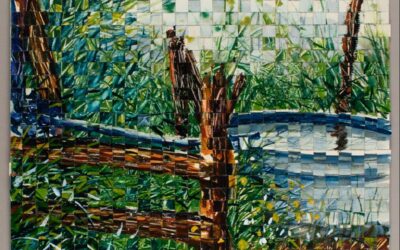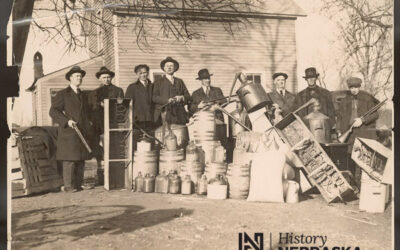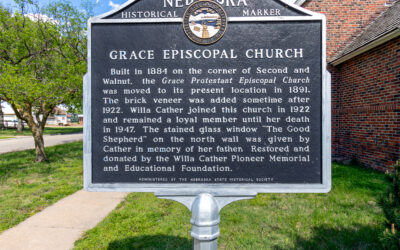HISTORY NEBRASKA MANUSCRIPT FINDING AID
RG0788.AM: Church Howe, 1839-1915
Papers: 1763-1919
Auburn, Nemaha County, Nebraska: Farmer, politician, diplomat
Size: 2.5 cu.ft.; 4 boxes + oversize
BIOGRAPHICAL NOTE
Church Howe, son of Albert Carlton and Mary Jane (Carr) Howe, was born in Princeton, Massachusetts, on December 13, 1839. Raised on the family farm, Howe received his early education at Princeton.
Howe left the family farm and worked as a clerk until the outbreak of the Civil War. In April 1861 he enlisted in the 6th Massachusetts Regiment, then served in the 15th Massachusetts, and later served on the staff of Major General John Sedgewick, attaining the rank of Major. Howe resigned his commission due to ill health in 1863.
Howe married Augusta C. Bottomly of Leicester, Massachusetts, on June 16, 1863. The Howes had one daughter, who died in infancy. An adopted son, Herbert R. Howe, ultimately became a partner in his father’s businesses.
President Andrew Johnson appointed Howe Collector of Internal Revenue for the 8th Massachusetts District by in 1866. Three years later he was appointed the first U.S. Marshall for Wyoming Territory by President Ulysses S. Grant. He held this position until late 1870. During his tenure as U.S. Marshal, Howe helped to organize the territorial government.
While en route to Wyoming, Howe had purchased 480 acres of land in Nemaha County, Nebraska, and in 1871 he returned there to settle permanently, engaging in farming and raising livestock. Howe eventually increased his holdings to more than 1000 acres. He also founded the nearby town of Howe.
In 1880 Church Howe formed a partnership with C.D. Nixon. Together they purchased 400 acres of land in the middle of Nemaha County and laid out the town site of Auburn. Howe also was one of the founders (and for many years the president and director) of the First National Bank of Auburn. During the 1880s Howe was employed by the Missouri Pacific Railroad Company and was involved in railroad contracting in Nebraska. He also served as a vice-president of the Missouri Pacific for several years.
Howe became active in Nebraska and Republican Party politics shortly after he settled in Nemaha County. He served four terms in the Nebraska House of Representatives and four terms in the State Senate, twice serving as president of the Senate. He was also a member of the State Normal Board, the State Relief Fund, the Republican State Committee from 1884-1888, the Nebraska Grange, and the G.A.R., serving as that organization’s department commander in 1894. He was a delegate to the Republican Party national convention in 1884. He ran twice for the U.S. Congress, in 1886 and in 1894, but was defeated.
Howe retired from farming and politics in 1896 and moved from his farm to Auburn. In 1897 President William McKinley appointed him U.S. Consul to Palermo, Italy. Subsequently he served as Consul to Sheffield, England, 1900-1903; Antwerp, Belgium, 1903-1906; Montreal, Canada, 1906-1907; and Manchester, England, 1907-1912. He returned to Auburn in 1912, where he closed his career by serving as Auburn’s mayor from 1913-1915. Church Howe died in Auburn, Nebraska, on October 7, 1915.
SCOPE AND CONTENT NOTE
This collection consists of manuscript material arranged in six series: 1) Correspondence, 1861-1919; 2) Letterpress Books, 1866-1896; 3) Scrapbooks, 1763-1919; 4) Consular Service Material, 1900-1909; 5) Autograph Books, ca. 1858-1899; and 6) Miscellany.
This material relates to the military, political, agricultural, business, and diplomatic careers of Church Howe. Some historical information about Howe’s ancestors is also provided, as is biographical information about Church Howe and his accomplishments.
The Correspondence, 1861-1919, of Series 1 documents a number of aspects of Church Howe’s life and career. Highlighted are his time in the military during the Civil War; his appointment as U.S. Marshal of Wyoming Territory in 1869; his railroad and town building promotion in Auburn, Nebraska; his involvement in the Republican Party and in Nebraska state politics; and his career in the U.S. Consular Service. Among the correspondents are President Benjamin Harrison, 1892; William Jennings Bryan, 1906; and then-Massachusetts governor, Calvin Coolidge, 1919 (writing to Herbert R. Howe, Church Howe’s son).
The Letterpress Books of Series 2 contain outgoing correspondence, 1866-1896, primarily written by Church Howe. A few letters were written by Herbert R. Howe. Topics discussed include Howe’s tenure as Collector of Internal Revenue for the 6th Massachusetts District, business interests, farming activities, the G.A.R., and politics.
Series 3 consists of Scrapbooks, 1763-1919. The first volume, housed in one folder and in an oversize box, includes information on ancestors of Church Howe, particularly Adonijah Howe; the courthouse in Charles County Virginia; the founding of Auburn, Nebraska; the First National Bank of Auburn, Nebraska; the Missouri Pacific Railroad in Nebraska; and Church Howe’s military service and diplomatic career. Volumes two through six contain newspaper clippings documenting G.A.R. reunions, national politics and political campaigns, Nebraska politics, agricultural experimentation, Howe’s political career, and Howe’s role in the U.S. Consular Service.
Series 4 contains publications about the U.S. Consular Service, 1900-1909, including a history of the U.S. Consular Service and rules and regulations governing its operations.
The Autograph Books of Series 5 are arranged topically and chronologically. Included are autographs of Civil War figures, 1862-1863; the Nebraska Legislature, 1875-1899; the Republican Party national convention, 1892; and autographs collected by Augusta C. Bottomly (Mrs. Church Howe), ca 1858-1862. Of particular interest is the volume containing autographs of Civil War figures, which contains the signatures of James A. Garfield, Gouverneur K. Warren, George L. Hartsuff, O.O. Howard, Alfred Sully, Joseph Hooker, and others. Because of its condition, the original volume is restricted; researchers must use the photocopy of this item.
The Miscellany of Series 6 includes biographical information about Church Howe, as well as banking documents and letterheads relating to Howe’s businesses.
Box 4 was added at a later date and is unprocessed. It contains eight volumes. Seven scrapbooks dating from 1873-1907 relate to Church Howe’s life and political career. The eighth volume, “Maps and Panoramas: Twelfth Annual Report of the U.S. Geological and Geographical Survey of the Territories, 1878,” relates to Howe’s time as Marshall of the Wyoming Territories.
INVENTORY
Series 1 – Correspondence, 1861-1919
Box 1
Folder
- 1861-1899
- 1900; 1903-1906; 1912; 1919
Series 2 – Letterpress books, 1866-1896
Box 1
Volume
- 1866-1893
- 1886-1894
- 1894
- 1894-1896 (see oversize)
Series 3 – Scrapbooks, 1763-1919
Box 1
Folder
- 1763-1919
Volume
- 1763-1919 (see oversize)
- 1884: Politics (see oversize)
- 1885-1894 (see oversize)
- 1906-1907: Nebraska politics (see oversize)
Box 2
Volume
- 1907-1910: U.S. Consular Service
- 1911: U.S. Consular Service
Series 4 – U.S. Consular Service material, 1900-1909
Box 2
Volume
- The Consular Service of the U.S. by Chester Lloyd Jones, 1905
- The Sheffield Commission Association, 1900 – Rules and Regulations
- Diplomatic and Consular Service guidelines, 1906
- Diplomatic and Consular Service guidelines, 1907
- Diplomatic and Consular Service guidelines, 1908
- Diplomatic and Consular Service guidelines, 1909
Series 5 – Autograph books, 1861-1899
Box 3
Volume
- Civil War figures, 1862-3
- Nebraska Legislature, 1875
- Nebraska Legislature, 1877
- Nebraska Legislature, 1879
- Nebraska Legislature, 1881
- Nebraska Legislature, 1885
- Nebraska Legislature, 1889
- Nebraska Legislature, 1891
- Nebraska Legislature, 1893
- Nebraska Legislature, 1893
- Republican Party National Convention, 1892
- Autograph Book of Augusta C. Bottomly (Mrs. Church Howe), ca. 1858-1862
Series 6 – Miscellany
Box 3
Folder
- Biographical materials
- Banking documents
- Letterheads
Box 4 – Scrapbooks (unprocessed)
Subject headings:
Auburn, Nebraska
Bryan, William Jennings, 1860-1925
Coolidge, Calvin (John Calvin), 1872-1933
Diplomatic and Consular Service
Diplomats
First National Bank of Auburn
Garfield, James Abram, 1831-1881
Grand Army of the Republic — Nebraska
Harrison, Benjamin, 1833-1901
Hartsuff, George L., 1830-1874
Hooker, Joseph, 1814-1879
Howard, Oliver Otis, 1830-1909
Howe, Church, 1839-1915
Legislative bodies — Nebraska
Missouri Pacific Railroad Company
Nemaha County, Nebraska
Politicians — Nebraska
Railroads — Construction and maintenance
Railroads — Nebraska — Nemaha County
Republican Party — Nebraska
Sully, Alfred, 1821-1879
United States — History — Civil War, 1861-1865 — Veterans
United States Consular Service
Warren, Gouverneur Kemble, 1830-1882
Revised TMM 12-21-2006; 05-30-2008




